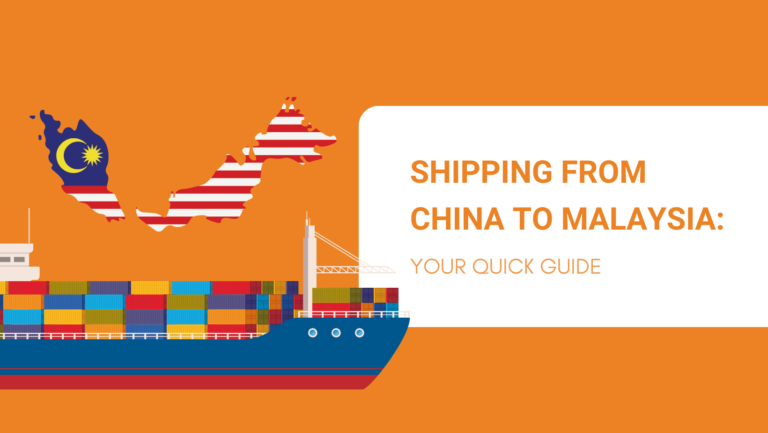When you’re looking to expand your business, understanding the intricacies of international logistics is key, especially if your trade route includes shipping from China to Malaysia.
China, a global manufacturing giant, and Malaysia, an emerging market with a strategic location in Southeast Asia, have established strong trade relations.
Navigating through the wide array of shipping options, transit times, and customs regulations can seem daunting.
With this guide, we aim to equip you with the knowledge to make cost-effective and timely shipping decisions, ensuring your cargo reaches its destination smoothly.

Trade Relations between China and Malaysia
The economic bonds between China and Malaysia are a pivotal aspect of international trade in Southeast Asia.
In 2021, Malaysia exported a substantial $47.9 billion worth of goods to China, with key exports like integrated circuits and petroleum gas being the frontrunners .
Conversely, China’s exports to Malaysia totaled $70.7 billion, with items such as integrated circuits and computers leading the export profile.
Your understanding of these trade dynamics is essential, considering that these figures reflect a rich tapestry of trade routes and agreements shaping shipping and logistic operations.
In light of COVID-19, the resilience of this trade relationship is noteworthy, with a reported growth of 5.7% to $131.16 billion in recent times, indicating robust economic interaction.
This thriving trade has greatly influenced the intricate logistics network between the two nations.
For instance, developments such as the East Coast Rail Link (ECRL) show the ambition to elevate logistic capabilities to bolster trade activities, with the project’s completion anticipated in 2026.
Your shipping strategy from China to Malaysia can therefore benefit greatly from this economic partnership.
With both countries continuously improving infrastructure and streamlining trade agreements, staying informed on these developments will be highly beneficial for your logistics planning.
Understanding Shipping Options
When you’re looking to ship goods from China to Malaysia, you have several options to consider, each with its own set of advantages and disadvantages.
Your choice will largely depend on how quickly you need your goods, the volume, and your budget.
Air Freight
Air freight is a fast and reliable mode of transport. It’s ideal when your shipment is time-sensitive or if you’re transporting high-value goods.
Pros
- Fastest method of shipping
- High level of security
- Regular flight schedules lead to reliable delivery times
Cons
- More expensive than sea and express freight
- Limited by cargo size and weight
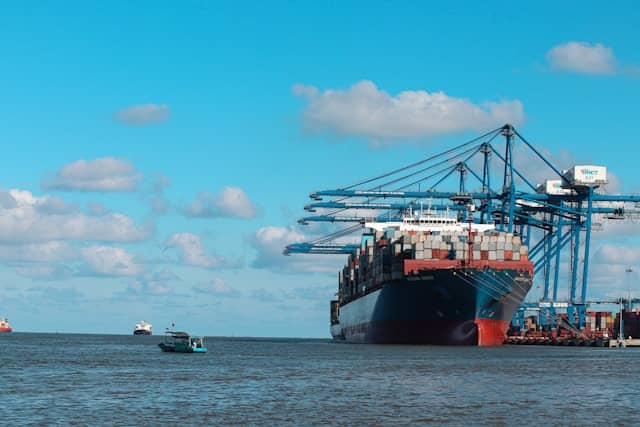
Sea Freight
Maritime transport is the backbone of international trade, and sea freight is the most cost-effective method for shipping bulky goods over long distances.
Pros
- Ideal for large shipments
- More cost-effective for heavy or bulky items
- Less carbon footprint compared to air freight
Cons
- Slower transit times
- More complex logistics management, including customs clearance
Express Shipping
Express shipping is managed by courier companies like FedEx, UPS, and DHL, offering swift delivery times for smaller shipments.
Pros
- Door-to-door service
- Fast delivery, typically within 3-5 days
- Simple tracking of shipments
Cons
- Higher cost per unit of weight
- Not suitable for large bulk shipments
Your choice will ultimately depend on your specific needs and constraints. Weighing the pros and cons of each option will ensure that your decision aligns with your logistics management strategy and delivery expectations.
Top-Rated China Freight Forwarder
Expert Shipping Solutions for Your Needs
Key Ports and Logistics Hubs
When you’re shipping from China to Malaysia, knowing the key ports and logistics hubs will streamline your logistics management process.
China and Malaysia are well connected through a variety of shipping routes, with the majority of maritime freight arriving at major Malaysian ports.
In China, some of the busiest ports include:
- Shanghai: The world’s busiest container port, ideal for bulk shipping due to its capacity and connectivity.
- Shenzhen: Positioned near Hong Kong, it’s a strategic hub for international shipping.
- Guangzhou: A major port for commercial shipping in the Pearl River Delta.
On the Malaysian side, key ports ensue:
- Port Klang: The principal port for Malaysia, which is a crucial player in the global shipping industry, especially for trade with China.
- Port of Tanjung Pelepas (PTP): A rapidly growing hub, often selected for its modern facilities and strategic location near the Malacca Strait.
- Kuantan Port: A significant hub in the east, which is expanding through strategic partnerships, like the collaboration with China Harbour Engineering Company Ltd for the Malaysia-China Kuantan International Logistics Park development.
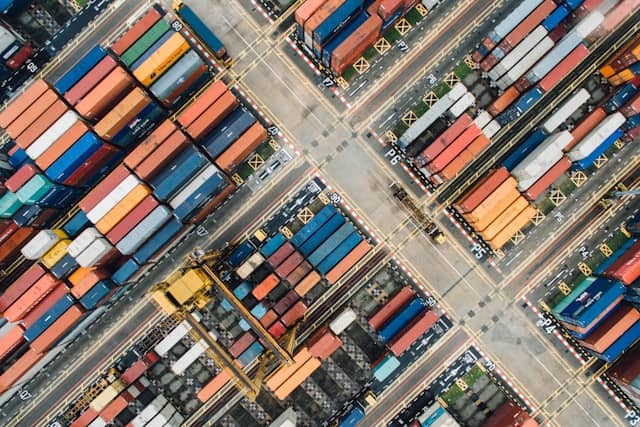
Your logistical considerations include choosing the right mode of transport, be it Full Container Load (FCL) or Less Than Container Load (LCL) for ocean freight, or selecting air freight when time is crucial.
It’s also important to consider the integration of services provided by logistics hubs and any strategic benefits they may offer for storage and distribution.
Below is a comprehensive table detailing the key ports and logistics hubs:
| China Ports | Features | Malaysia Ports | Features |
| Shanghai | Largest port with extensive connections | Port Klang | Main port with access to numerous shipping lines |
| Shenzhen | Near Hong Kong, excellent for international routes | PTP | Modern facilities, sits on major trade routes |
| Guangzhou | Access to Pearl River Delta, a pivotal commercial region | Kuantan Port | Growing hub, part of China’s Belt and Road Initiative |
Your choice of port combination should factor in cargo type, urgency, cost, and the final destination of your goods within Malaysia.
Always stay informed about the latest developments in shipping and logistics to ensure you can make the most cost-effective and time-efficient choice.
Cost Considerations When Shipping from China to Malaysia
When you’re looking into shipping from China to Malaysia, understanding the varied costs involved is key to budgeting your freight effectively.
The overall expense of shipping can be influenced by several factors, such as the choice between air freight and sea shipping, the weight and volume of your cargo, and the type of goods being shipped.
Freight Charges
Freight charges encompass the cost to actually transport goods from China to Malaysia. They vary widely based on the shipping method you choose.
- Air Freight: Ideal for urgent deliveries, though typically more expensive.
- Sea Freight: Cost-effective for larger shipments, but with longer transit times.
Customs Duties
Once your goods arrive, they must clear customs. This can incur fees dependent on the value and type of products, including customs duties and taxes specific to Malaysia.

Below are tables of pricing estimates when shipping goods from China to Malaysia using different shipping options:
FCL Rates from China to Malaysia
| Departure Port | Destination Port | Container 20’ (USD) | Container 40’ (USD) |
| Shanghai | Port Kelang | 150 | 300 |
| Shanghai | Penang | 150 | 300 |
| Shanghai | Pasir Gudang | 150 | 300 |
| Shenzhen | Port Kelang | 100 | 150 |
| Shenzhen | Penang | 140 | 210 |
| Shenzhen | Pasir Gudang | 140 | 210 |
| Ningbo | Port Kelang | 150 | 300 |
| Ningbo | Penang | 150 | 300 |
| Ningbo | Pasir Gudang | 150 | 300 |
LCL Rates from China to Malaysia
| Departure Port | Destination Port | USD/CBM |
| Ningbo | Port Kelang | 10 |
| Ningbo | Penang | 10 |
| Ningbo | Pasir Gudang | 20 |
| Shanghai | Port Kelang | 10 |
| Shanghai | Penang | 10 |
| Shanghai | Pasir Gudang | 20 |
| Shenzhen | Port Klang | 10 |
| Shenzhen | Penang | 10 |
| Shenzhen | Pasir Gudang | 15 |
Air Freight Rates from China to Malaysia
| Departure City | Destination Airport | Price Per KG (in USD) |
| Shanghai | Kuala Lumpur (KUL) | ~2 |
| Guangzhou | Kuala Lumpur (KUL) | 2.5 to 3 |
These figures are rough estimates and can be impacted by commodity type, seasonality, and the specifics of your shipment. For accurate pricing, it’s advisable to get a free quote specific to your cargo details.
Tips for Cost-Effective Shipping
- Consolidate Shipments: Combining smaller shipments can save costs.
- Plan Ahead: Avoid rush shipping by planning; slower options are cheaper.
- Understand Fees: Be aware of potential hidden fees, such as warehousing or inland transportation.
- Seek Expert Help: A knowledgeable freight forwarder can assist in navigating the complexities of international shipping.
Paying attention to these details and strategically planning can lead to significant savings in shipping costs.
Transit Times and Scheduling
When you’re shipping from China to Malaysia, understanding the transit times and scheduling is crucial for effective logistics management.
Different modes of transportation will have varying timeframes, so selecting the right one depends on your needs.
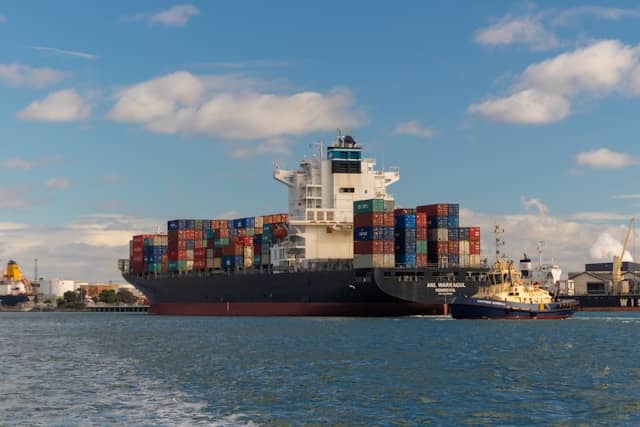
Maritime Transport
By sea, a cargo ship will usually take approximately 4 to 7 days to travel from China to Malaysia. The shipping schedule could be influenced by weather conditions and port traffic, among other factors.
It’s best to check with the carrier for the most current departure times. The frequency of departures can vary from multiple times a week to every two weeks, depending on the shipping company.
Factors that affect shipping schedules:
- Weather conditions
- Port congestion
- Customs procedures
- Cargo volume
Air Freight
If you’re opting for speed, air freight is faster, taking about 3 to 5 days from airport to airport. However, possible delays due to factors like customs clearance or cargo handling should be considered.
Below is a summary table with average transit times:
| Method | Transit Time |
| Sea Freight | 4 – 7 days |
| Air Freight | 3 – 5 days |
Remember to plan and book your shipments in advance, especially during peak seasons or if dealing with sensitive schedules.
Always coordinate with your shipping partner for the latest updates and best practices in maritime transport and logistics management.
Customs Clearance and Compliance
When importing goods from China to Malaysia, understanding and adhering to customs regulations is crucial for a smooth process. Your items must clear customs before entering Malaysia, which involves several steps.
Document Preparation
To begin, you must prepare the necessary documentation. This includes:
- Commercial Invoice: This details the transaction between seller and buyer.
- Bill of Lading or Airway Bill: A contract between the owner of the goods and the carrier.
- Packing List: Details about the packaging of the shipped goods.
- Import Permit: Required for certain controlled items.
- If applicable, an Insurance Certificate provides proof of insurance coverage for the shipped goods.
Compliance with Regulations
Each category of goods might have specific regulations that you need to comply with. For example, certain products may require additional certificates or inspections before being allowed into Malaysia.

Customs Duties and Taxes
You are responsible for paying any customs duties and taxes associated with your shipment. The amount depends on the classification and value of the goods, which is determined by Malaysian customs authorities.
Inspections
Goods may be subject to physical inspection to verify their nature and quantity against the provided documents. This is to ensure that no prohibited items are being brought into Malaysia and that all customs regulations are met.
Remember, each of these stages requires attention to detail. A thorough understanding of the process and what’s required can help avoid unnecessary delays.
Choosing the Right Freight Forwarder
When you’re looking to ship goods from China to Malaysia, selecting the right freight forwarder is crucial for a smooth transaction. Here’s a step-by-step guide to help you in your selection:
1. Identify Your Needs.
Understand what kind of shipping services you require. Whether it’s air freight for speedy delivery or sea freight for cost-effectiveness, your needs will dictate the kind of forwarder you’ll work with.
2. Research and Qualify.
Look for a freight forwarder with a strong track record. A reliable forwarder should have ample experience in shipping from China to Malaysia. Check their customer reviews and industry certifications.
3. Services Offered.
Confirm the services they provide. Ideally, they should offer comprehensive logistics management, including storage, consolidation, and packing services.
4. Customs Knowledge.
Go for a forwarder well-versed in Malaysia’s import regulations, duty rates, and procedures to ensure your shipment complies with customs regulations without delays.
5. Communication.
Effective communication is paramount. Choose someone who responds promptly and keeps you informed at every step.
6. Network and Partnerships.
Ensure they have a solid network in both China and Malaysia, which can be critical in addressing any contingencies during transit.
7. Cost.
Request quotes from different forwarders. Compare not just the price, but the value—what does the cost cover? Look for transparency in their pricing structure.
Top-Rated China Freight Forwarder
Expert Shipping Solutions for Your Needs
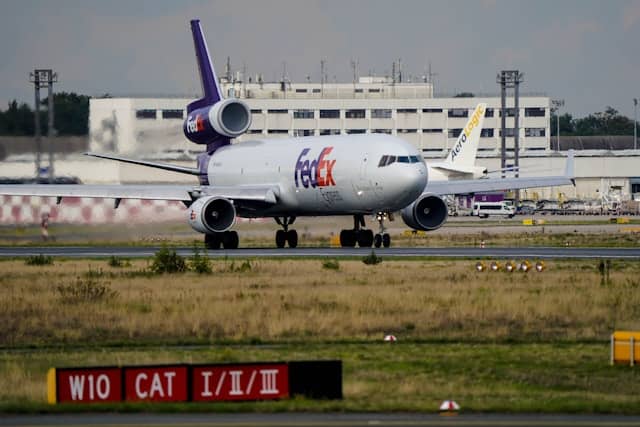
FAQs about Shipping from China to Malaysia
In navigating the shipping process from China to Malaysia, you likely have specific questions about import duties, shipping times, and regulations. The following FAQs address common concerns to help streamline your imports.
What Are the Import Duty Rates for Goods Transported from China to Malaysia?
Understanding the import duty rates for goods you’re shipping from China to Malaysia is crucial for budgeting and compliance.
Rates vary depending on the product category and the value of the goods. For detailed information, including tariff classifications and applicable rates, consult the Customs Tariff Code Malaysia.
How Does Shipping Duration Vary for Shopee Purchases from China to Malaysia?
When buying items through Shopee from China, shipping times can vary. It usually depends on the chosen shipping method, such as standard or express shipping, and whether any unexpected delays occur in transit or customs.
What Are the Prohibited Items to Ship from China to Malaysia?
Shipping regulations are strict, and some items are prohibited from entry into Malaysia.
The list of prohibited items includes, but is not limited to, dangerous goods like flammable materials, weapons, counterfeit goods, and toxic substances.
Ensure you know these restrictions to avoid customs issues and potential penalties.
Final Thoughts: Charting Your Course from China to Malaysia
Navigating the intricate process of shipping from China to Malaysia requires careful planning and consideration. With the right preparation, your venture can run smoothly.
Tariffs and Regulations: Familiarize yourself with Malaysia’s customs policies. Certain products are subject to restrictions and you’ll have to anticipate these variables when planning your shipment.
Choosing the Right Mode of Transport: Whether opting for air or sea freight, weigh the options based on your budget and timeline. Sea freight typically offers more volume at a lower cost, whereas air freight is faster but can be pricier.
Documentation and Clearance: To prevent any delays, ensure that all your documents are correct and complete. This includes commercial invoices, packing lists, and any other required papers for customs clearance.
Partnering with Logistics Providers: Establishing a relationship with reliable logistics providers can simplify your shipping experience.
They can guide you through the complex procedures and ensure that your goods reach their destination without unexpected hiccups.
Stay Informed: Keep abreast of the latest industry changes and updates by regularly reviewing shipping guidelines. This knowledge is vital in forecasting potential challenges and pivoting your strategies accordingly.
If you want to source quality products from China to Malaysia, we’re here to help! Submit your request for a quick sourcing quote and explore a trove of sourcing opportunities!
To further streamline your shipping process, consider our comprehensive freight forwarding services. We handle everything from pickup at the supplier in China to final delivery in Malaysia, ensuring a smooth and efficient shipping experience. Our expertise in customs regulations and documentation can help you navigate the complexities of international shipping with ease.
For a customized logistics solution that covers all aspects of your China-to-Malaysia shipping needs, request a freight forwarding quote today.
